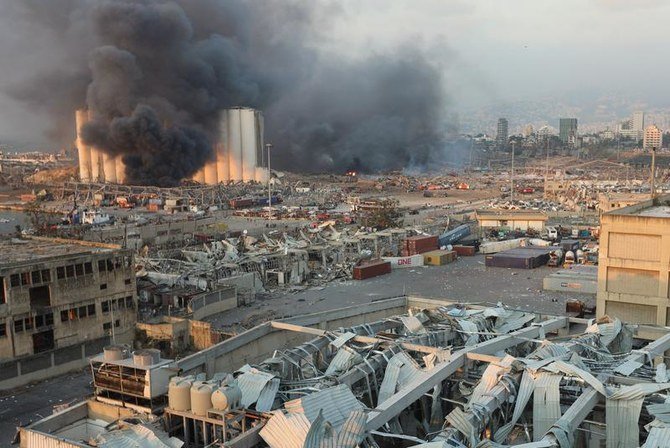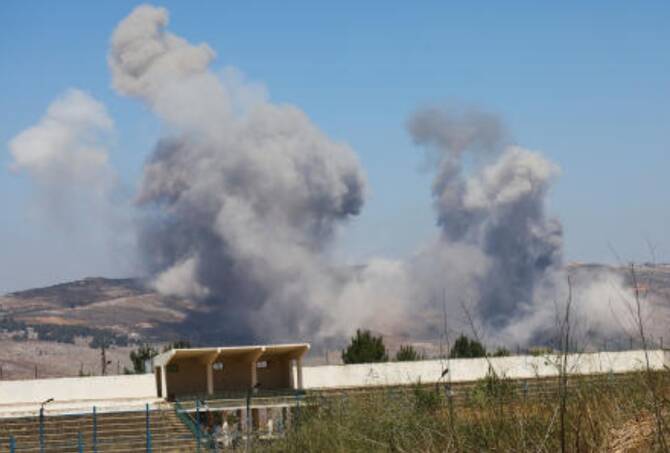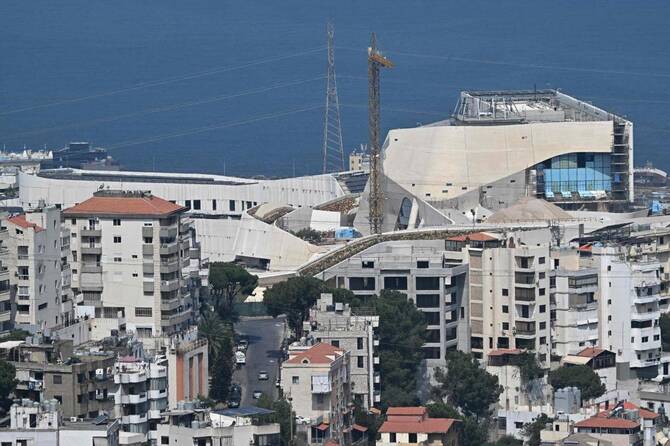BEIRUT: Judge Tareq Bitar, the judicial investigator into the Beirut port explosion, was informed on Monday that he had been suspended from the case after MP Nohad Al-Machnouk filed an appeal against him last week.
Bitar suspended his investigation and all procedures related to the file, pending a decision by the Beirut Appeals Court to accept or reject the appeal filed by Al-Machnouk.
Bitar was appointed on Feb. 19 as the second judge to lead the investigation into the explosion, after Judge Fadi Sawan. On Feb. 18, Sawan was suspended from the file, four months after his appointment to lead the investigation, following requests by former ministers Ali Hassan Khalil and Ghazi Zuaiter, whom Sawan charged in relation to the incident, with the file was transferred due to “legitimate suspicion.”
The disaster, which shook the world on Aug. 4, 2020, claimed the lives of 215 people, injured more than 6,500 and destroyed the waterfront of the Lebanese capital. It was caused by the ignition of ammonium nitrate, part of a cache estimated at 2,750 tons, according to official estimates, which was stored in silo number 12 of the port, along with quantities of other seized explosives.
It was confiscated from a ship docked in the port in 2014.
Bitar and Sawan included in their accusations former Prime Minister Hassan Diab, several other current ministers and MPs, senior army officers, general and state security officers, senior employees at the port, as well as some judges.
The allegations were based on crimes related to negligence, causing the death of more than 200 people, wounding thousands of people, some of them seriously with physical deformities and permanent disabilities, in addition to the destruction of the port and its facilities, as well as multiple homes and public and private properties.
Bitar had interrogated on Monday the former intelligence chief, Jawdat Oweidat, and began holding a session to interrogate Brig. Gen. Kamil Daher and Brig. Gen. Ghassan Gharzeddine in the case, when he was informed of the decision to suspend him.
Arab News learned from a judicial source that, last Friday, Bitar referred the attorney general, Judge Ghassan Khoury, to the Public Prosecutor at the Court of Cassation, and requested a case against him for “filing away the ammonium nitrate file when it was in his possession.”
The process of prosecuting judges is the responsibility of the Public Prosecutor at the Court of Cassation and not to the judicial investigator in the crime.
The decision to suspend Bitar is official, but it is not final, pending the decision of the Court of Appeal. If Al-Machnouk’s request is accepted, then matters will return to square one.
Former Minister Youssef Fenianos, a defendant in the case, had previously submitted a “request to transfer the explosion file from Judge Bitar due to legitimate suspicion.”
Bitar renewed his referral to the Public Prosecution two new requests addressed to the minister of interior and the General Secretariat of the Council of Ministers, requesting permission to prosecute the Director General of General Security Maj. Gen. Abbas Ibrahim, and the Director General of State Security Maj. Gen. Tony Saliba.
Bitar had set Sept. 30 to interrogate Minister Ali Hassan Khalil, Oct. 1 for the interrogation of ministers Ghazi Zuaiter and Al-Machnouk, and Oct. 4 as a new date for hearing former Prime Minister Hassan Diab, who is in the US, after Bitar decided to inform him of the date of his interrogation session.
Former Public Prosecutor Judge Hatem Madi said that “when the judiciary is shaken, this means that a mistake has occurred.” He told Arab News: “There is a crime that took place in the port of Beirut. The first judicial investigator was removed and now the second judicial investigator is being removed. How long will this interaction with the judiciary continue? Is there an intention to appoint a third judicial investigator? What if he followed in the footsteps of the two previous judges? Are they going to remove him, too? (Are they going to continue) until the judiciary is empty of its judges, or will they resort to judges from another planet?”
Madi said that “when the opponent is suspicious of the impartiality of the judge, he is afraid that he will judge against his interest.”
On whether Bitar is impartial in his work, Madi said: “When a judge works, someone stands against him, even if he is just. Usually, judges bypass this. I do not know the criminal policy followed by Judge Bitar, but what he has done so far is good, it is professional, and there is no doubt about it. As for why he chose this method and not another method, the file is his responsibility and he is the boss, and he chose the path that he saw fit. It does not mean that he made a mistake.”
Bitar received threats from Hezbollah to remove him from the file. The first threat was by Hezbollah Secretary-General Hassan Nasrallah last August, who publicly accused him of “politicizing” the case, adding: “Either he (Bitar) adheres to a clear technical investigation, or the judiciary must find another judge.”
The second threat came from Hezbollah’s security and liaison officer, Wafiq Safa, who went last week to the Palace of Justice in Beirut and met with several judges. He told Lara Al-Hashem, a journalist at the Palace of Justice, to deliver a message to Bitar, saying: “We are tired of you. We will follow the legal path to the end, and if the situation does not go well, we will uproot you.”
Al-Hashem revealed on Sunday that she “delivered the message to Judge Bitar, and his response was: “Wafiq Safa is right, no matter how my uprooting process was.”
She said that she also conveyed Safa’s message to the discriminatory Public Prosecutor. She added that there was “data of communications, surveillance cameras and witnesses, and I am under the roof of the law.”
Hezbollah’s threats sparked outrage within the judiciary, but it did not reach the level of public mass condemnation.
Imad Wakim, a member of the Lebanese Forces Party’s parliamentary bloc, commented on the suspension of Bitar from the file, tweeting: “Do you want Wafiq Safa as a judicial investigator?”






















